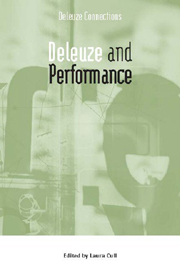Book contents
- Frontmatter
- Contents
- Introduction
- 1 Performing in the Chaosmos: Farts, Follicles, Mathematics and Delirium in Deleuze
- Act I Deleuze on Theatre: Artaud, Beckett and Carmelo Bene
- Interval
- Act II Confronting Deleuze and Live Performance
- 6 Becoming a Citizen of the World: Deleuze Between Allan Kaprow and Adrian Piper
- 7 sub specie durationis
- 8 Thinking Through Theatre
- 9 Becoming–Dinosaur: Collective Process and Movement Aesthetics
- Interval
- Act III A Digital Deleuze: Performance and New Media
- Notes on Contributors
- Index
8 - Thinking Through Theatre
from Act II Confronting Deleuze and Live Performance
Published online by Cambridge University Press: 12 September 2012
- Frontmatter
- Contents
- Introduction
- 1 Performing in the Chaosmos: Farts, Follicles, Mathematics and Delirium in Deleuze
- Act I Deleuze on Theatre: Artaud, Beckett and Carmelo Bene
- Interval
- Act II Confronting Deleuze and Live Performance
- 6 Becoming a Citizen of the World: Deleuze Between Allan Kaprow and Adrian Piper
- 7 sub specie durationis
- 8 Thinking Through Theatre
- 9 Becoming–Dinosaur: Collective Process and Movement Aesthetics
- Interval
- Act III A Digital Deleuze: Performance and New Media
- Notes on Contributors
- Index
Summary
Deleuze and Guattari define philosophy, art and science as three modes of thinking, each moving in their own way: art thinks through affects and percepts; science thinks through knowledge; and philosophy thinks through concepts. These three modes of thinking take place on different ‘planes’ and utilise different ‘elements’. The brain is the junction, not the unity, of these three planes.
Deleuze and Guattari introduce these ideas in What is Philosophy?, the final book they wrote together. They are not, of course, the first to ask the question ‘what is philosophy?’, but, they observe, many of the answers that have been given are too abstract and betray the desire to do philosophy, rather than reflect on it. Could it be, they wonder, that one can only ask (and answer) the question of what philosophy is once one is no longer driven by this desire?
There are times when old age produces not eternal youth but a sovereign freedom, a pure necessity in which one enjoys a moment of grace between life and death, and in which all parts of the machine come together to send into the future a feature that cuts across all ages: Titian, Turner, Monet. In old age, Turner acquired or won the right to take painting down a deserted path of no return that is indistinguishable from a final question. Vie de Rancé could be said to mark both Chateaubriand's old age and the start of modern literature. Cinema too sometimes offers us its gifts of the third age, as when Ivens, for example, blends his laughter with the witch’s laughter in the howling wind. Likewise in philosophy, Kant’s Critique of Judgement is an unrestrained work of old age, which his successors have still not caught up with: all the mind’s faculties overcome their limits, the very limits that Kant so carefully laid down in the work of his prime. (Deleuze and Guattari 1994: 2)
- Type
- Chapter
- Information
- Deleuze and Performance , pp. 147 - 160Publisher: Edinburgh University PressPrint publication year: 2009



